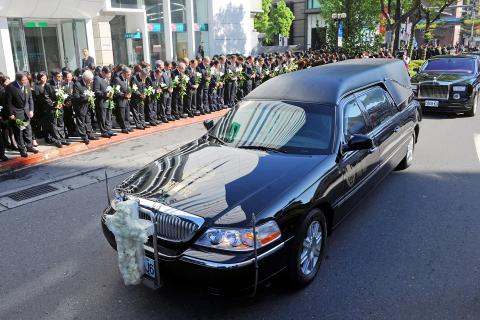The body of Jeffrey Koo Sr (辜濂松), founder and former chairman of one of Taiwan’s largest banks, Chinatrust Financial Holding Co, arrived in Taiwan early yesterday morning.
Koo died at the age of 79 on Dec. 5 in New York after reportedly battling Parkinson’s disease for some years.
The charter plane carrying Koo’s body along with members of his family was greeted by dozens of Chinatrust executives and other Koo family members.

Photo: CNA
The Koo family organized a simple ceremony led by a pastor for the late banker at an EVA Airways cargo facility before taking his body in a motorcade to Taipei.
The motorcade drove past Chinatrust’s headquarters in Taipei’s Xinyi District (信義), where more than 2,000 employees lined up on the street to mourn Koo’s death, many of them in tears.
The motorcade then drove to Sanjhih (三芝) in New Taipei City (新北市), where Koo’s body was to be temporarily placed.
Later, more than 300 Chinatrust employees were taken to Sanjhih to pay their respects to Koo.
According to Chinatrust, his family will organize a requiem Mass.
Koo went to the US earlier this year for treatment, where he was reported to have been diagnosed with a brain tumor.
He died in the company of his family.
His elder son, Jeffrey Koo Jr (辜仲諒), who had been previously barred from leaving the country over his alleged role in a financial scandal, paid a record NT$1billion (US$34.3 million) as a guarantee late last month in exchange for court permission to visit his ailing father in New York.
The late tycoon represented Taiwan in the international arena in numerous capacities, including serving as the nation’s representative on the APEC’s Business Advisory Council from 1995 to 2009.
A long-time “ambassador-at-large,” in September Koo was conferred the Order of the Rising Sun by the Japanese government, the highest honor given by Japan to businesspeople, for his contributions in promoting Japan-Taiwan ties.
He has also been honored by former president Chen Shui-bian (陳水扁) and President Ma Ying-jeou (馬英九) for his long-term efforts in expanding Taiwan’s ties with the international community, and pushing for economic and trade cooperation with other countries.

Taiwan is stepping up plans to create self-sufficient supply chains for combat drones and increase foreign orders from the US to counter China’s numerical superiority, a defense official said on Saturday. Commenting on condition of anonymity, the official said the nation’s armed forces are in agreement with US Admiral Samuel Paparo’s assessment that Taiwan’s military must be prepared to turn the nation’s waters into a “hellscape” for the Chinese People’s Liberation Army (PLA). Paparo, the commander of the US Indo-Pacific Command, reiterated the concept during a Congressional hearing in Washington on Wednesday. He first coined the term in a security conference last

Prosecutors today declined to say who was questioned regarding alleged forgery on petitions to recall Democratic Progressive Party (DPP) legislators, after Chinese-language media earlier reported that members of the Chinese Nationalist Party (KMT) Youth League were brought in for questioning. The Ministry of Justice Investigation Bureau confirmed that two people had been questioned, but did not disclose any further information about the ongoing investigation. KMT Youth League members Lee Hsiao-liang (李孝亮) and Liu Szu-yin (劉思吟) — who are leading the effort to recall DPP caucus chief executive Rosalia Wu (吳思瑤) and Legislator Wu Pei-yi (吳沛憶) — both posted on Facebook saying: “I

Sung Chien-liang (宋建樑), who led efforts to recall Democratic Progressive Party (DPP) Legislator Lee Kun-cheng (李坤城), was released on bail of NT$80,000 today amid outcry over his decision to wear a Nazi armband to questioning the night before. Sung arrived at the New Taipei District Prosecutors’ Office for questioning in a recall petition forgery case last night wearing a red armband bearing a swastika, carrying a copy of Adolf Hitler’s Mein Kampf and giving a Nazi salute. Sung left the building at 1:15am without the armband and covering the book with his coat. Lee said today that this is a serious

Firefighters are working to put out a fire on Taipei’s Yangmingshan (陽明山) reported earlier this morning. The cause of the fire is still under investigation. The Taipei Fire Department said it received a report of a fire at Xiaoyoukeng (小油坑) at 11:17am, dispatching four command vehicles, 16 firetrucks, one ambulance and 72 personnel. The fire is still burning on about 250m² of land, according to initial estimates, as eyewitnesses reported seeing smoke rising from the mountain. The Yangmingshan National Park Headquarters on Facebook said the Qixingshan (七星山) hiking trail starting from Xiaoyoukeng and the Xiaoyoukeng parking lot are closed as firefighters work to put